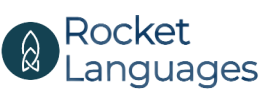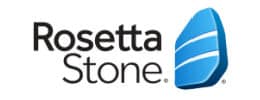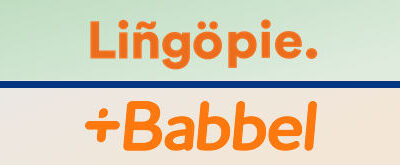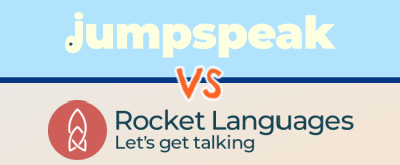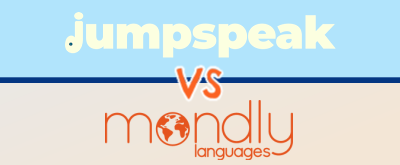Rosetta Stone is one of the most popular language learning companies in the entire world. But does that mean it’s better than Rocket Languages? In this article, we evaluate which company offers the more effective language learning courses from top to bottom.
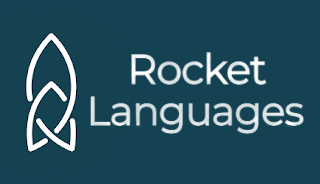
Sale: 60% OFF
Use Code: INSIGHT60
|
$180 lifetime |
Our absolute favorite app to learn a new language. With audio lessons, detailed grammar instruction, and diverse exercises, Rocket has it all. |
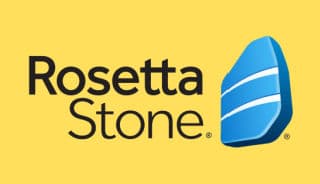
Discount: 60% OFF
Applied In Cart
|
$10-$15/mo |
The classic, tried and true language learning company. Based on immersion and imagery, this is the perfect app for visual learners. |
Video: Rosetta Stone or Rocket Languages?
In the video above, Bianca from the Guide2Fluency team compares the language learning apps from Rocket Languages and Rosetta Stone.
Editor’s Choice
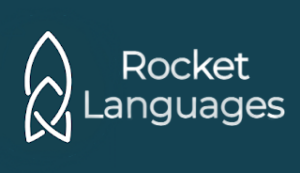
Rocket Languages
- Free Trial
- Money Back Guarantee
Pros
- Engaging audio lessons that improve your listening and verbal skills
- Top-notch speech recognition technology (Google’s Web Speech API)
- Lesson flexibility (can do lessons while driving)
- Detailed grammar instruction and cultural explanations
- Newly revamped digital platform and mobile app experience
Cons
- Lessons on the longer side (45-60 min)
- Lessons could use more visuals/graphics
How The Rocket & Rosetta Stone Lessons Compare
Let’s begin this post by looking at how the two programs work, and then compare them side-by-side.
Looking at Rosetta Stone from a high level, there are 20 units in the program to complete. These units each cover major thematic topics, such as Home & Health, Everyday Things, and Work & School.
Within each of these 20 units, there are 4 main lessons to complete. Doing some quick math, 20 units x 4 lessons = 80 total lessons in the entire program. It’s really not too bad, all things considered. It even sounds a little light compared to some other programs.
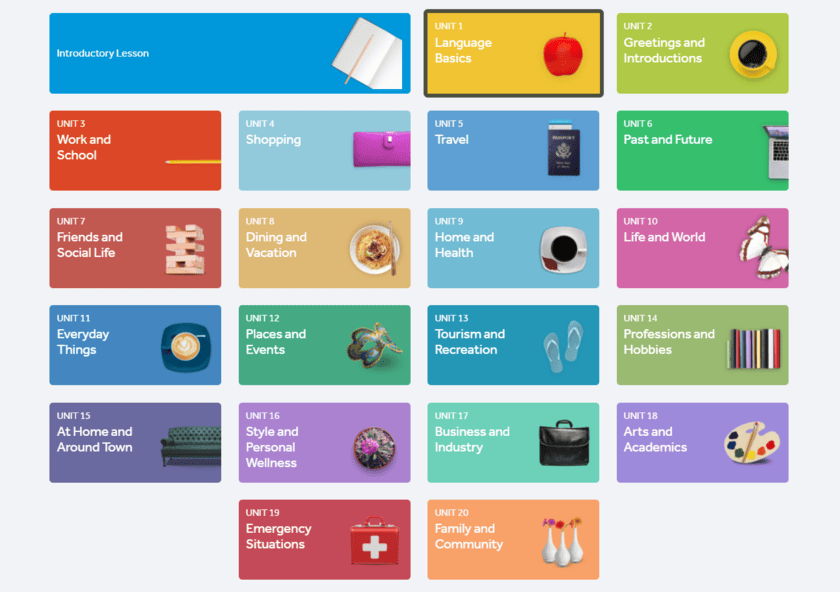
That being said, each lesson is pretty comprehensive. Each lesson is built around a core 30-minute learning module, with a mix of supplemental drills around that. The supplemental drills each cover pronunciation, grammar, reading, vocab, writing, or listening, and they take about 5-10 minutes each.
As for the core 30-minute learning module in each lesson, however, the thing you need to know about Rosetta Stone is that the program is largely built around images. Almost every single drill is built on a series of pictures, which you use in some way or another.
Sometimes the program will speak a phrase and you need to match what was said to the correct image. Other times, the program will have you match written phrases to the images.
Sometimes you need to say what you see in the image, and Rosetta Stone will have their speech software listen in. Or, in some instances, the pictures are used to teach grammar.
Regardless, the bottom line is that Rosetta Stone mainly uses pictures to teach the language you’re learning. The program is clearly built to have you create mental associations between what you’re learning and imagery.
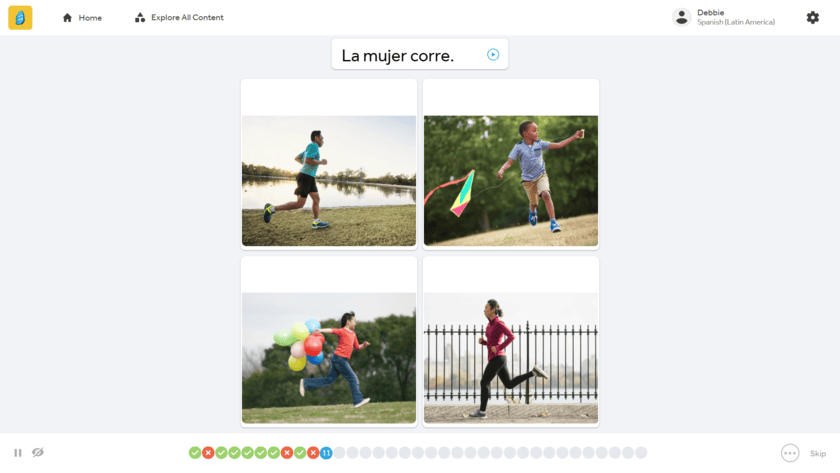
This forces you to rely more on intuition rather than memorization to learn the language, so you don’t have to use English as a go-between.
Now, switching gears, Rocket Languages is pretty different in their approach. Their entire program begins and ends with audio lessons. There is very little use of imagery in the Rocket program like there is with Rosetta Stone.
To start each Rocket Languages unit, you’ll listen to an in-depth, 30-minute audio lesson. In this lesson, an English-speaking moderator will guide you through a dialogue in the language you’re learning step-by-step.
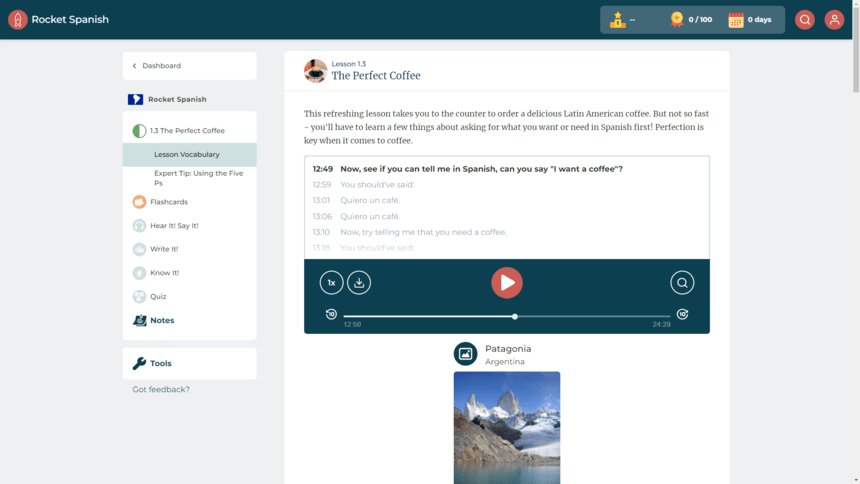
You’ll listen to a sentence or two, then the moderator will briefly stop to explain what’s going on, what you just heard, and have you participate in the conversation by answering questions and repeating phrases.
Plus, while you listen to the audio exercise, a rolling transcript plays underneath where you can see how words are spelled and follow along.
Then after the audio lesson, you review what you just learned through a variety of drills and exercises. In this way, the drills are kind of like homework after a class session.
These reinforcement drills include exercises such as listen and repeat-type drills, flashcards, quizzes, and reenacting the underlying conversation from the audio lesson by playing the part of one of the two speakers. That last one is my personal favorite.
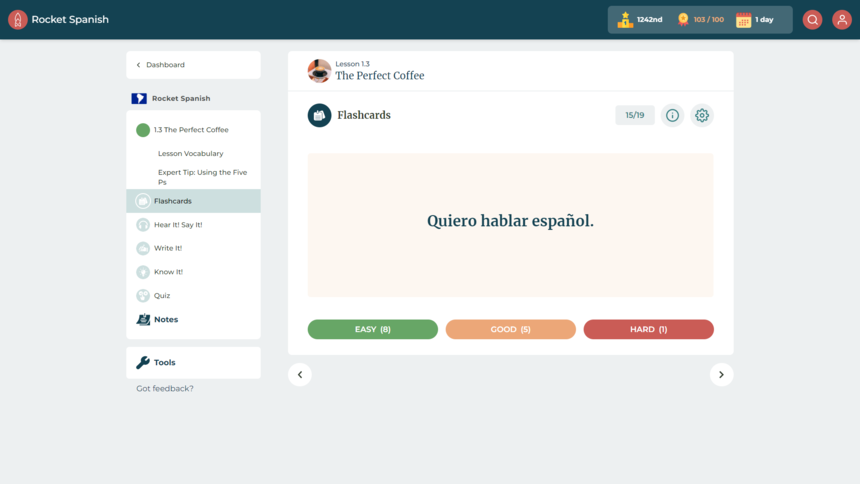
However, that’s just the primary part of the Rocket program. The other half of the lesson work in each Rocket module is a series of “language & culture lessons.”
In these lessons, Rocket dives deep into a specific grammar principle, which they break down with short explanations, examples and graphics. The point of this lesson type is to zero in on structural differences between English and the language you’re learning, and have you learn grammar more directly.
That’s more or less Rocket Languages in a nutshell though. Their program is all about audio lessons backstopped by reinforcement drills, plus some detailed grammar & culture lessons.
From a high level, that’s how the two companies compare. Both companies’ lessons are about an hour long from end-to-end, but they’re very different in format.
The Rosetta Stone lessons are really image heavy and focus more on learning intuitively, while the Rocket lessons are all about immersion through audio lessons.
Cost Comparison
Before we dive straight into discussing what I like and don’t like about each program, let’s quickly touch on cost.
Rosetta Stone has three plans to choose from. First, there’s a 3-month subscription plan which costs $12 per month. There’s also a 12-month plan which retails for $12 per month (i.e. the same price). And lastly, there’s a lifetime plan, which is a one-time purchase and gives you access for life to all of Rosetta Stone’s languages for $300.
If you’re wondering why the 12-month plan costs the same as the 3-month plan, it’s because Rosetta Stone is almost always running a sale on that 12-month package, and it’s most often found for $8 per month. Similarly, the lifetime package, although it retails for $300, can almost always be found on sale for $180 total.
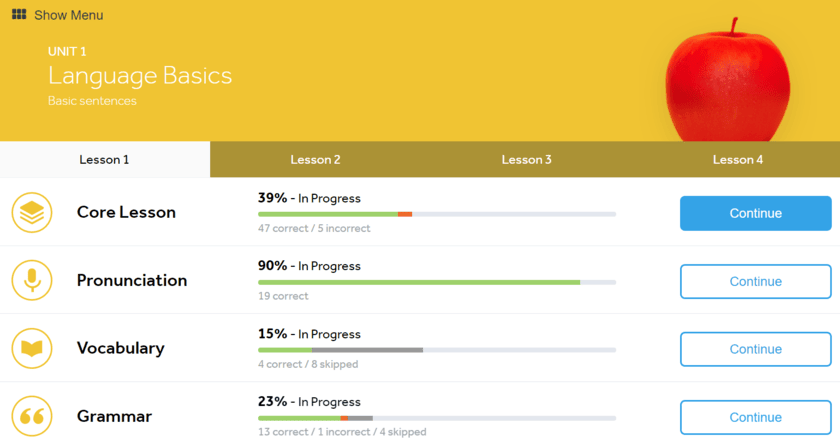
Rocket Languages, on the other hand, is a little different in their pricing model since they don’t offer monthly subscription plans. Instead, Rocket only offer one-time purchase, lifetime plans. You buy the course and get access forever.
The Rocket packages all retail for around $150 to $450, depending on whether you want the beginner-only, intermediate, or advanced bundle.
Thus, in terms of pricing, it’s a little hard to compare these two programs, as Rocket doesn’t have monthly subscription plans, while Rosetta Stone does. However, in terms of each company’s lifetime plans, they’re pretty equal in price.
Rosetta Stone’s lifetime package can usually be found on sale for around $180, and Rocket Languages is incredibly aggressive with their discounting. You can almost always find their courses discounted by at least 50%, if not more, making the cost pretty comparable.
Why Rocket Languages Is Better Than Rosetta Stone
Now let’s attack where I see each program being better than the other. And let’s begin with Rocket Languages, as I give them a higher overall grade.
Engaging Audio Lessons
The first advantage for Rocket Languages is clearly their audio lessons. As noted above, these audio lessons are the heart and soul of this program, and what makes Rocket different from most other language apps.
Personally, I think these audio lessons are extremely engaging and do a great job of getting you to actually think under pressure and verbalize what you’re learning.
You’ll notice that with a lot of other language apps, including Rosetta Stone, they don’t have any significant amount of listening or speaking exercises. However, that’s literally the bulk of the Rocket program content.
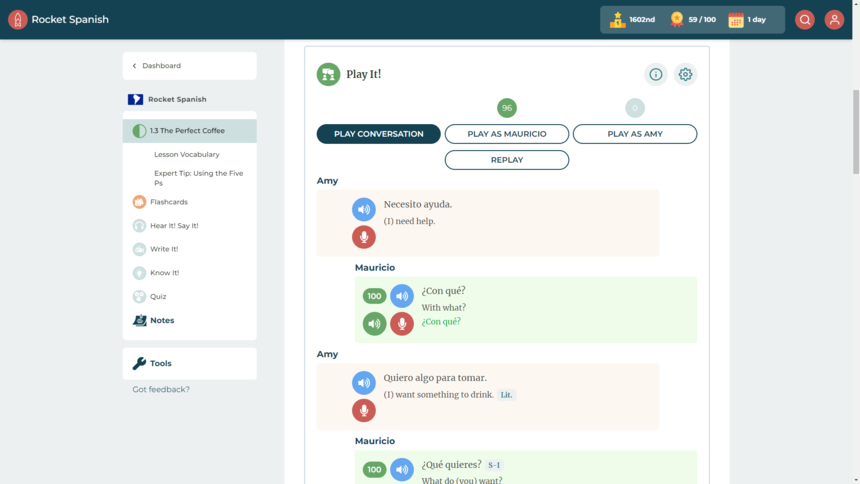
To me, listening and speaking routinely is about the most powerful way of truly internalizing a new language and becoming comfortable with it. You just have to hear a lot of your target language.
Plus, one of the coolest parts of the Rocket audio lessons is that when you’re done, you can then play the underlying conversation that the lesson is built upon in real time, and play the part of one of the two actors. That is really powerful.
Better Speech Recognition Technology
I might get some pushback for my next Rocket win, but I think their speech software is better than Rosetta’s tech.
Although the Rosetta Stone speech software (called TruAccent) gets a ton of hype because they have a patent on it, and have spent so much time and money on it, I found it to be over-sensitive.
There were times that I knew I would be pronouncing a phrase correctly, only to be told that I was wrong. The program would then make me repeat it, sometimes three times in a row. It got pretty frustrating.
Now, Rocket’s speech tech isn’t perfect, but I definitely prefer it. Rocket Languages uses Google’s web speech API for their underlying software, and it is a really strong program.
It’s less sensitive (in a good way), is more accurate, and provides more helpful feedback with a grade of 1-to-100.
Thus, if pronunciation feedback is important to you, I am a huge fan of Rocket Languages.
Grammar & Culture Explanations
Finally, my last win for Rocket over Rosetta Stone is the series of “language & culture” lessons I referenced earlier.
When it comes to grammar, Rosetta Stone does things a little differently than most language apps. Rather than more direct instruction, they sort of let the user discover grammar intuitively.
In essence, they teach you important grammar points, like verb conjugations and the passive voice, through the image exercises.
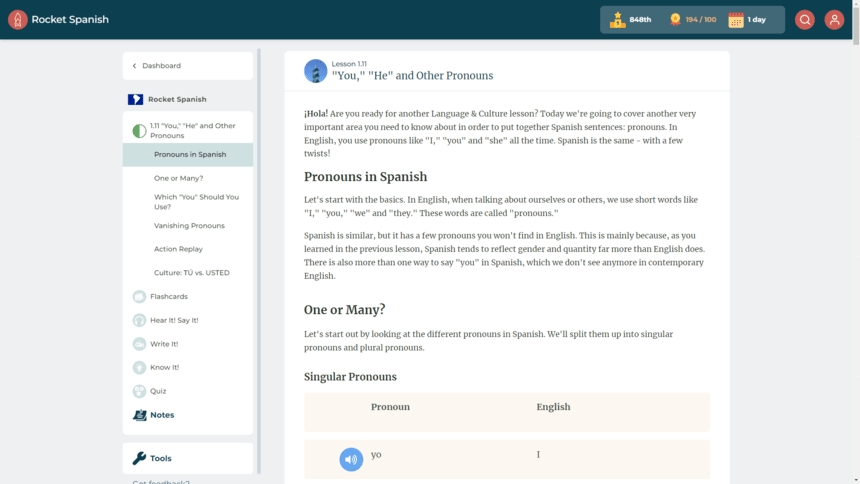
This way, as you see the different sentence structures and verb forms over and over in the drills, you start to intuitively pick up how the language works. In contrast, Rocket’s in-depth language & culture lessons dive directly into important grammar principles.
However, the nice thing is that they don’t clobber you with over-analysis. It’s usually just a quick 2-3 sentence explainer, followed by some examples.
Rocket will do that for a handful of points in each lesson, which I really like. It keeps things short and digestible.
Plus, they sprinkle in some cool cultural things about etiquette and manners as well, which I think is pretty nice. Overall, the Rocket style of grammar instruction just worked a little better for me.
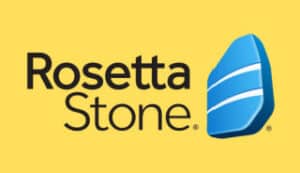
Rosetta Stone
- Multiple Subscription Options
- Money Back Guarantee
Pros
- Great option for visual learners (lots of pictures and imagery)
- Tons of extra resources (e.g. phrasebooks and videos)
- Slightly shorter lessons than Rocket’s
- Immersive learning experience (makes you think critically)
- Live classes available for students who need/want more
Cons
- Lessons can feel repetitive at times
- Lessons need more detailed verbal practice
Why Rosetta Stone Is Better Than Rocket Languages
Having covered where Rocket has its strengths over Rosetta Stone, let’s get to Rosetta’s advantages.
More Imagery Than Rocket’s Lessons
The first advantage for Rosetta Stone, and where I see them beating Rocket Languages, is all the visuals and graphics in the program.
If you’re a visual learner, I think there is no doubt that you have to go with Rosetta Stone.
Some people are just pure visual learners. They associate the new things they learn with pictures and graphics, so that when they hear that word again, the image comes straight to mind.
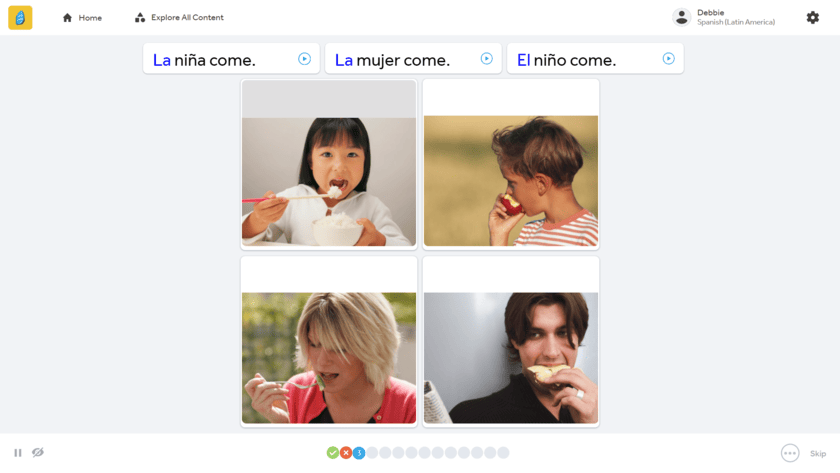
Alternatively, sometimes it’s even the opposite that when they see something similar to the image, the vocab comes to their mind.
If you’re one of these people that learns visually and makes mental associations, Rosetta Stone is awesome. With all the pictures in the program, it will be very effective for you.
Immersion Is The Name of The Game
Another aspect of the Rosetta Stone program that I like is its use of immersion. Basically, in the Rosetta Stone program as a whole, there is very little use if English.
They don’t directly tell you what to do in each exercise in English, or translate words and sentences for you. This relates back to the point I made earlier about learning intuitively.
Rosetta Stone wants you to be immersed in the language for the half hour or so that you’re working exercises each day by struggling a little bit.
Now, to be fair, they do in some parts of the program give you translations, but usually you have to work for it.
Not to mention, the reality is that one of the fastest ways of learning a new language (though difficult) is being immersed in the language day in and day out. And Rosetta Stone tries to give you a brief experience of that everyday.
Now, to some people, this approach can be a little frustrating because you will get hung up at times, but if you don’t mind struggling at certain parts, it can be highly effective.
Extra Learning Resources
The final highlight of the Rosetta Stone program is all of the cool, extra resources they provide (similar to Mondly and Duolingo).
Rocket has a decent suite of its own extras, with language survival kits, forums, and leaderboards, but Rosetta Stone offers way more supplemental tools.
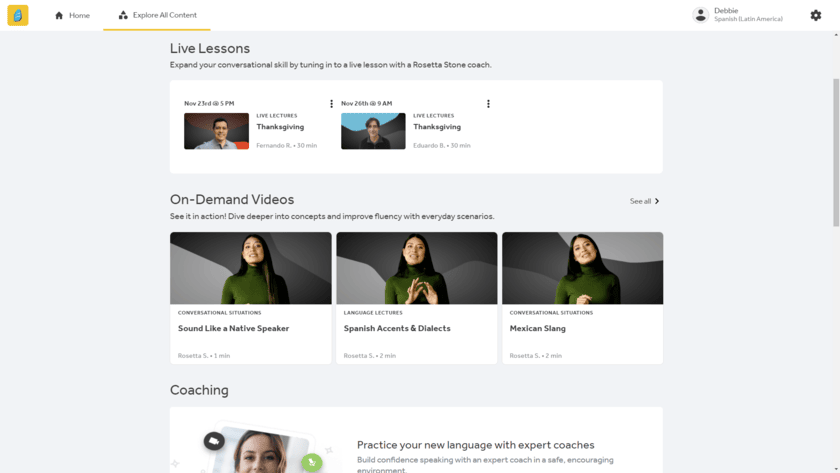
There are phrasebooks, short on-demand video lessons, stories, audio companion lessons, and even some live lessons. They just have an incredibly comprehensive bundle of tools for you to use outside of the main lessons.
Thus, if you’re very serious about learning and want to do some extra credit outside of your daily lessons, Rosetta Stone is likely gonna give you more opportunity than Rocket.
Verdict: Which Language App Is Better?
After using each program for a while now, I much prefer Rocket Languages. Rosetta Stone’s program has some serious advantages, such as its heavy use of imagery, high repetition, the immersive effect you get when doing lessons, and all of the cool extra resources they provide.
However, at the end of the day, Rocket Languages’ lessons and overall learning framework are just much more robust and comprehensive than Rosetta’s in my opinion. Not only does Rocket provide better speech software and dedicated grammar and culture content, but more importantly, I really like the guided conversations that are the focal point of their lessons. I personally think these audio lessons will really help propel you to an intermediate level of fluency faster than Rosetta Stone.
The lessons from Rocket Languages are centered around interactive audio lessons and grammar explanations, whereas the lessons from Rosetta Stone primarily revolve around matching words and phrases to images. It is an audio-centric program vs a graphic-heavy program.
After testing each program, our team unanimously agreed that Rocket Languages offers a more effective language learning program than Rosetta Stone. Their in-depth audio lessons put their course over the edge.
After taking into consideration discounts and promotions, the lifetime subscription to Rocket Languages is about on par with the equivalent package from Rosetta Stone.

